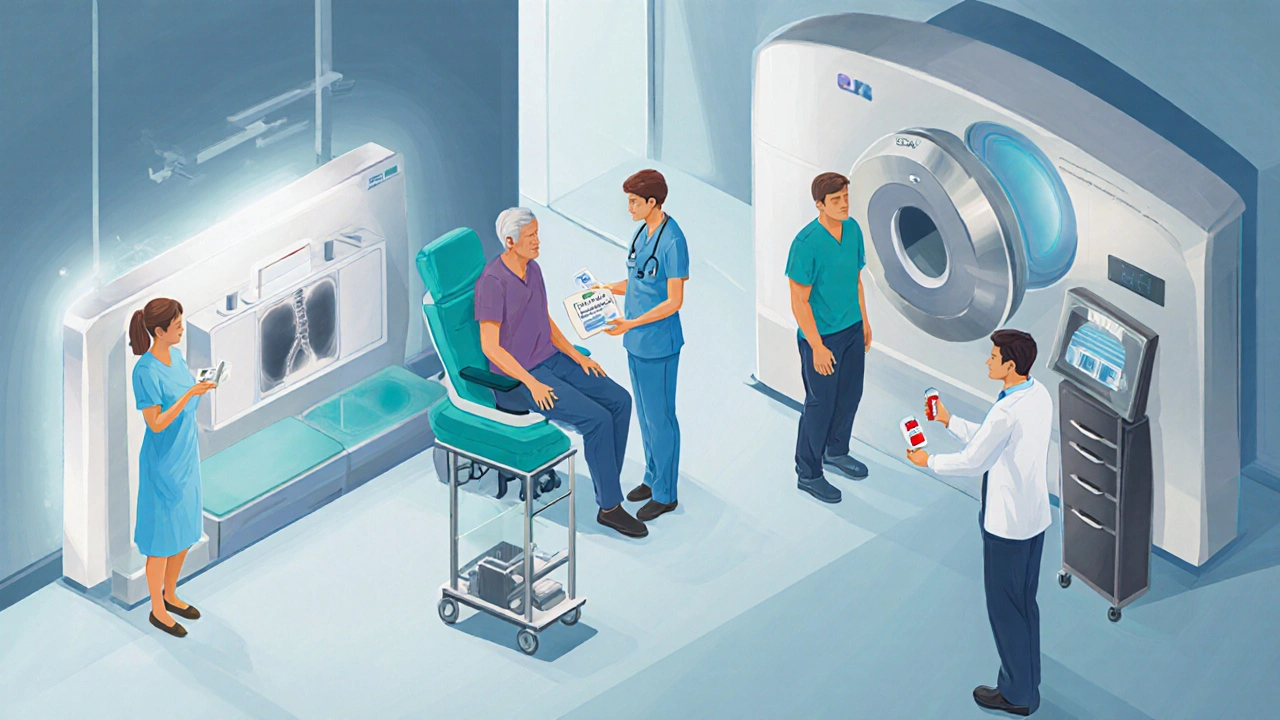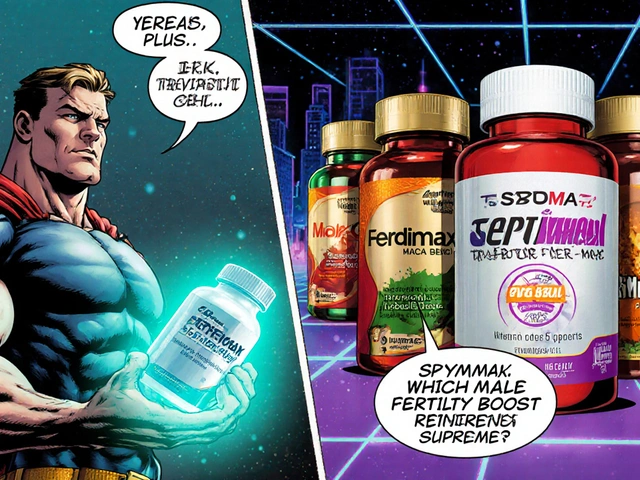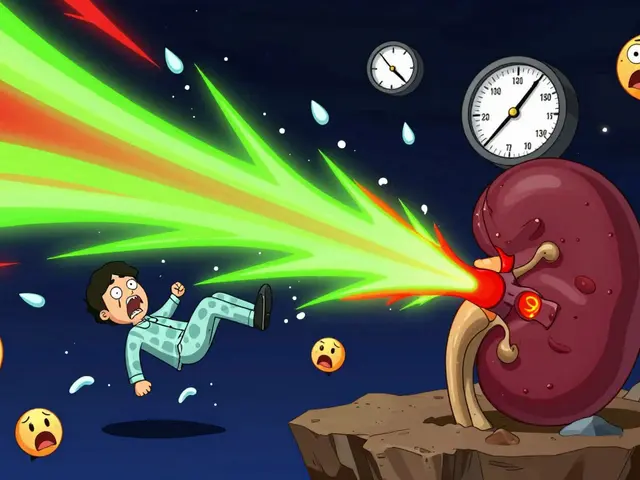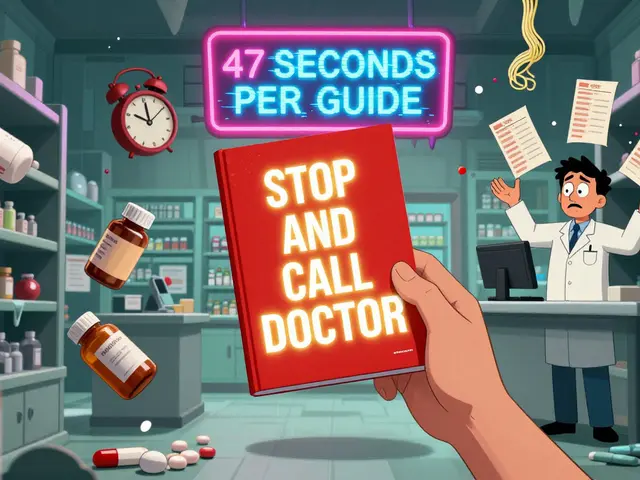Cancer Screening Schedule Planner
Your Information
Your Recommended Screening Schedule
Enter your information and click "Check My Schedule" to see your recommended screenings.
About Cancer Screenings
Regular cancer screenings are crucial for early detection and improved survival rates. According to the NHS, catching cancer early can significantly increase treatment success and reduce long-term health impacts.
Key Benefits:
- Early detection increases survival rates
- Less invasive treatments are often possible
- Screenings are generally quick and painless
- Cost-effective compared to late-stage treatment
Quick Take
- Finding carcinoma early can double survival rates for many cancers.
- National guidelines recommend specific tests at set ages - stick to them.
- Screenings are quick, often painless, and become cheaper the earlier they catch disease.
- Missing an appointment can mean a tumor grows unnoticed for months.
- Talk to your GP about personal risk factors and get a personalized schedule.
When it comes to health, carcinoma is a type of cancer that begins in the tissue that lines organs and glands. Early detection isn’t a luxury; it’s a lifeline. Regular cancer screening programs exist because research shows that catching a tumour when it’s still small dramatically improves treatment options and survival odds. In the UK, the NHS runs organized programmes for breast, cervical, bowel and lung cancers, while other tests like the PSA blood test help men monitor prostate health. Let’s walk through why these checks matter, what’s available, and how to make the most of them.
Why Early Detection Saves Lives
Imagine a car that only gets a service when the engine finally makes a scary noise. By the time you hear that clunk, the damage may be extensive. Cancer behaves similarly - a tumour can double in size every few weeks. Detecting it before it spreads (metastasis) means surgery can often remove it completely, and chemotherapy or radiotherapy can stay low‑dose.
Statistical snapshots back this up. For breast carcinoma, the 5‑year survival rate jumps from around 85% when diagnosed at stageIII to more than 98% at stageI. Colon cancer follows the same pattern: early‑stage detection yields a 90% survival rate, versus under 20% once it’s spread to distant organs. Those numbers translate into years of life saved, fewer side‑effects, and lower treatment costs.
Core Screening Tests You Should Know
Mammography is an X‑ray exam of breast tissue that spots tiny calcium deposits and dense masses before they’re palpable. In the UK, the NHS invites women aged 50‑70 for a two‑yearly walk‑through, with an optional extension to 47‑73 based on risk.
Colonoscopy visualises the entire large intestine, allowing doctors to remove polyps that could become cancerous. The bowel cancer screening programme offers a stool‑based test every two years from age60, followed by a colonoscopy if the result is positive.
Pap smear (cervical cytology) collects cells from the cervix to detect abnormal changes that could evolve into cervical carcinoma. Women aged 25‑64 are screened every three years, or every five years when paired with HPV testing.
Low‑dose CT (LDCT) uses a reduced‑radiation scan to spot small nodules in the lungs, the leading cause of cancer death. The UK pilot targets current or former heavy smokers aged 55‑74, offering an annual scan.
PSA test measures prostate‑specific antigen in the blood, flagging potential prostate carcinoma. While not part of a national organised programme, many GPs advise men over 50 (or earlier with a family history) to discuss testing.
Recommended Screening Schedules (UK)
| Cancer Type | Screening Test | Typical Starting Age | Frequency |
|---|---|---|---|
| Breast | Mammography | 50 (optional 47) | Every 2 years |
| Colorectal | Stool FIT → Colonoscopy if positive | 60 | Every 2 years (FIT) |
| Cervical | Pap smear (± HPV test) | 25 | Every 3 years (Pap) / Every 5 years (HPV) |
| Lung | Low‑dose CT | 55 (heavy smokers) | Annually |
| Prostate | PSA blood test | 50 (or 45 with family history) | Discuss with GP, usually every 2-3 years |
How to Prepare for Your Screening
- Know the timing. Set reminders a month before the due date - a phone alert works better than a sticky note buried in a drawer.
- Fast if required. Colonoscopy and some blood tests ask for a 12‑hour fast; write down the exact start time to avoid confusion.
- Bring medication lists. Certain drugs (like aspirin) can affect blood‑clotting tests or imaging results.
- Ask about comfort measures. For mammography, wearing a sports bra the night before reduces lingering residue; for LDCT, a breath‑hold training video can ease the scan.
- Plan post‑appointment transport if sedation is used (colonoscopies often involve a short-acting sedative).

Common Myths That Stall Appointments
Myth #1: “I feel fine, so I don’t need a test.”Feeling well is exactly why you should get screened - many early tumours cause no symptoms.
Myth #2: “Radiation from mammograms will give me cancer.”The dose from a mammogram is less than a single day of natural background radiation, far below levels that cause harm.
Myth #3: “If I have a family history, I’m doomed.”Family history raises risk, but regular screening can catch hereditary cancers early and improve outcomes dramatically.
When to Talk to Your GP About Personal Risk
Everyone has a baseline risk, but certain factors tilt the scale:
- Smoking or heavy alcohol use - especially for lung and liver carcinomas.
- Obesity and sedentary lifestyle - linked to breast, colorectal, and pancreatic cancers.
- Genetic mutations (BRCA1/2, Lynch syndrome) - merit earlier and more frequent testing.
- Previous abnormal results or precancerous lesions - call for tighter follow‑up.
Bring a simple list of these details to your next GP visit. Most practices will generate a personalised schedule, sometimes recommending earlier entry into a programme or an extra test like a full‑body MRI for high‑risk individuals.
Overcoming Practical Barriers
Time off work, travel distance, or anxiety can all stop you from booking. Here are quick fixes:
- Use NHS online booking - it shows the nearest centre and lets you pick a slot that fits your shift.
- Ask your employer about paid health‑screening leave; many UK workplaces have a statutory right to reasonable time off for medical appointments.
- Consider mobile screening units; several NHS trusts run pop‑up mammography vans in rural towns.
- Invite a friend or family member for moral support - studies show accompaniment reduces anxiety by up to 30%.
What Happens After a Positive Result?
A positive screening doesn’t equal a cancer diagnosis. It flags a finding that needs clarification - usually a diagnostic biopsy or a more detailed imaging study. The NHS typically arranges these follow‑ups within two weeks. If cancer is confirmed, you’ll be referred to a multidisciplinary team (MDT) that includes surgeons, oncologists, radiologists, and a specialist nurse. This coordinated approach ensures you get a treatment plan tailored to your tumour’s stage, genetic profile, and personal preferences.
Next Steps: Building Your Personal Screening Calendar
Grab a printable calendar or a digital health app. Mark each screening’s start age and repeat interval. Set alerts for a month ahead, then again a week before, so you never miss a window. Review the calendar annually with your GP - they might shift a date based on new research or your health changes.
Remember, each appointment is a small investment that can add years to your life. The sooner you embed regular checks into your routine, the stronger your defense against carcinoma becomes.
Frequently Asked Questions
How often should I get a mammogram if I’m 55?
The NHS invites women aged 50‑70 for a mammogram every two years. If you’re 55, you’ll receive a reminder automatically, but you can ask for a yearly scan if you have a strong family history or dense breast tissue.
Is the low‑dose CT scan safe for smokers?
LDCT delivers about 1/10th the radiation of a standard chest CT. For heavy smokers, the benefit of catching an early lung tumour far outweighs the tiny radiation risk.
Can I skip the PSA test if I have no symptoms?
The PSA test is optional in the UK. Discuss your personal risk factors with your GP; if you have a family history, regular testing every 2‑3 years is wise, even without symptoms.
What should I do if I missed a screening appointment?
Call the screening centre as soon as possible. Most will slot you in within a few weeks. If the missed test was part of a regular programme, they’ll reset the interval based on the new date.
Are there any risks to colonoscopy?
Complications are rare - perforation occurs in about 1 in 1,000 procedures and serious bleeding in about 1 in 2,000. The benefits of removing precancerous polyps outweigh these small risks for most adults over 60.







Comments
Aaron Perez
October 1, 2025 AT 22:47 PMAmid the bustling corridors of modern medicine, one might pause to contemplate the paradox of ignorance and vigilance; we are afforded the marvel of early detection, yet many choose the comfortable darkness of denial. The very act of scheduling a mammogram, a colonoscopy, or a low‑dose CT becomes a ritual-an ode to the fleeting certainty that life offers. Each appointment is a communion with the future, a promise that we will not surrender to the silent creep of carcinoma. Yet society, in its complacent haste, often whispers that screenings are optional, that the inconvenience outweighs the benefit-this is the false narrative that fuels countless tragedies. Consider the statistical truth: a 5‑year survival rate soaring above 98 % for stage‑I breast cancer versus a grim 20 % when discovered late; the numbers do not deceive. For colorectal malignancies, early polyp removal can prevent a cascade of mutations that would otherwise culminate in a terminal diagnosis. The NHS's organized programs are not bureaucratic red tape but carefully calibrated shields against the relentless march of disease; they are the result of decades of epidemiological wisdom, distilled into actionable guidelines. While some may argue that radiation exposure from mammography is perilous, the dose is dwarfed by everyday background radiation-an infinitesimal risk when measured against the potential lifesaving payoff. The psychological comfort of knowing "I am being screened" can be as therapeutic as the test itself, reducing anxiety that otherwise festers unchecked. Moreover, integrating screenings into one's routine mirrors the discipline of daily exercise or dental hygiene-habitual care that accrues exponential benefits over time. Governments and healthcare providers invest heavily in outreach precisely because the cost of late‑stage treatment eclipses that of early detection many folds over; economics and ethics converge on the same conclusion. The digital age now offers tools-online portals, reminder apps, mobile units-that demolish the logistical barriers that once plagued the average citizen. Even the most reticent individuals can now book an appointment with a few clicks, a testament to progress that should galvanize participation. Let us not forget that the journey from a simple stool test to a life‑saving colonoscopy is a continuum of vigilance; each step is a brick in the fortress protecting our health. If we relinquish this vigilance, we hand the reins to fate, allowing carcinoma to claim its victims under the guise of "it could happen to anyone." Therefore, embrace the schedule, set those reminders, enlist a friend for moral support, and view each screening as an investment in your future self. In the grand tapestry of existence, few threads are as vital as the ones that safeguard our very being; let early detection be the golden thread that weaves longevity into our lives.
William Mack
October 8, 2025 AT 21:27 PMHey folks, think of screenings like gym sessions for your organs-quick, effective, and they keep you in the game for the long haul.
Evan Riley
October 15, 2025 AT 20:07 PMDon't be fooled by the NHS narrative; behind those clean stats lies a pharma agenda pushing endless testing to keep us hooked on their patented follow‑up procedures.
Nicole Povelikin
October 22, 2025 AT 18:47 PMi thnk they over hype it, like its the end of the world if you miss one, i mean who has time for that??
Michelle Weaver
October 29, 2025 AT 16:27 PMScreenings are evidence‑based and cost‑effective; they save lives and reduce long‑term healthcare expenses 😊
John Keough
November 5, 2025 AT 15:07 PMI'm curious about the exact age thresholds-are they flexible based on personal risk factors? Also, how often should someone with a family history of breast cancer get a mammogram?
Graham Smith
November 12, 2025 AT 13:47 PMThere are a few grammatical errors in the article: "carcinoma" should be capitalized only at the beginning of a sentence, and "screenings" is plural, not "screening".
Jeremiah Morgan
November 19, 2025 AT 12:27 PMDear community, I echo the importance of adhering to screening schedules; they are a cornerstone of preventive healthcare.
nina greer
November 26, 2025 AT 11:07 AMOne might argue that early detection is merely a fashionable cliché.
Montague Tilmen
December 3, 2025 AT 09:47 AMOur nation should prioritize these screenings; health is a patriotic duty.
Clarise Wheller
December 10, 2025 AT 08:27 AMI appreciate the thoroughness of this guide; it makes planning my appointments much easier.
Riley Fox
December 17, 2025 AT 07:07 AMPhilosophically speaking, each screening is a moment of self‑inquiry-do we confront the hidden realities within our bodies, or do we turn a blind eye? ; Yet the data obliges us to act; the margins of error are too slim to ignore! 😉
David Stephen
December 24, 2025 AT 05:47 AMLet's support each other in staying on top of these health checks; together we can make a difference.
Roberta Giaimo
December 31, 2025 AT 04:27 AMGreat article-thanks for the clear breakdown! 👍
Tom Druyts
January 7, 2026 AT 03:07 AMStay motivated, folks! A quick reminder now saves years later.
Julia C
January 14, 2026 AT 01:47 AMAnother boring health reminder.